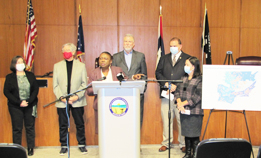
Sojourner’s Truth Staff
The second phase of the Emergency Rental and Utility Assistance Program has launched. The program, funded by the American Rescue Plan of 2021, has supplied $22.7 million for the first and second rounds of rental assistance and provided relief for 1900 households in the first round.
“Rental assistance is needed everywhere,” said Director of Neighborhoods Rosalyn Clemens pointing to a map of Toledo during the announcement on Thursday.
Clemens touted the differences between the first phase, which provided nearly $12.6 million in financial support to residents and the second phase which will provide an additional $10.1 million.
“We don’t have to wait for the landlords to apply, tenants can go directly to apply with a direct or indirect connection to COVID,” she explained. In addition, the assistance, which was for a maximum term of 15 months in the first round, is now for 18 months.
“I am thrilled to announce that the partnership that Lucas County began with the City of Toledo in May to help residents across our community who are facing unexpected and difficult circumstances as a result of this global pandemic has been replenished with new funds,” said Lucas County Commissioner Tina Skeldon Wozniak. “We are grateful to announce the relaunch of this critical county-wide program to alleviate the pressure and stress families have about their unpaid rental payments, especially while we are in the middle of the holiday season.”
“The Toledo-Lucas County Rental Assistance Program has been a lifeline to many who were worried about keeping a safe and secure roof over their heads, especially our most vulnerable residents, the low income and communities of color,” said Commissioner Pete Gerken. “Renters have been among the hardest hit by the economic crisis caused by COVID-19 and continue to face a very challenging time. The restart of this program will keep thousands of Lucas County families in their homes, ensuring that they get back to work without having to worry about missed rent payments and outstanding utility bills.”
“With many tenants unable to pay rent or keep up with their utility expenses and the federal eviction moratorium no longer in place, it is essential that we help our renters weather the storm through this pandemic,” said Commissioner Gary L. Byers. “We are continuing our partnership with the City of Toledo and again utilizing the resources of NeighborWorks, Lutheran Social Services, and Pathway to provide
“The City of Toledo is committed to making sure that residents who are at risk for homelessness, or have housing instability, are helped financially so that they can stay in their homes,” Mayor Wade Kapszukiewicz said. “We are very happy for this second round of funding. We are looking forward to ensure that our residents are safe, and able to meet their daily needs.”
The program assists low to moderate-income households in the city and county with up to 18 months of rent, utility, and internet support. That may include payment for current and future rent, past due rent, late fees, new renter fees, security deposits, and utility deposits and payments.
In order to be eligible for rent assistance funds, applicants:
- Must rent a residential unit in Toledo or Lucas County.
- Have a valid and current lease signed by both landlord and tenant or other documentation supporting the existence of a rental relationship.
- Qualify for unemployment or have experienced a reduction in household income, incurred significant costs, or experienced a financial hardship due to or during the COVID-19 pandemic.
- Demonstrate a risk of experiencing homelessness or housing instability.
- Fall below the maximum household income requirement.
Applications will only be accepted online via the Neighborly TLCERAP Software portal, which is posted at toledo.oh.gov/renters. Partner organizations will provide marketing and outreach for the program and provide technical assistance with the application on a first come, first served basis.
